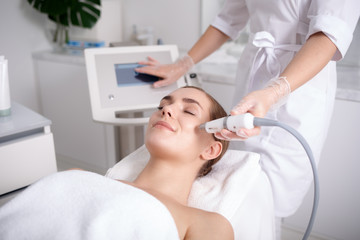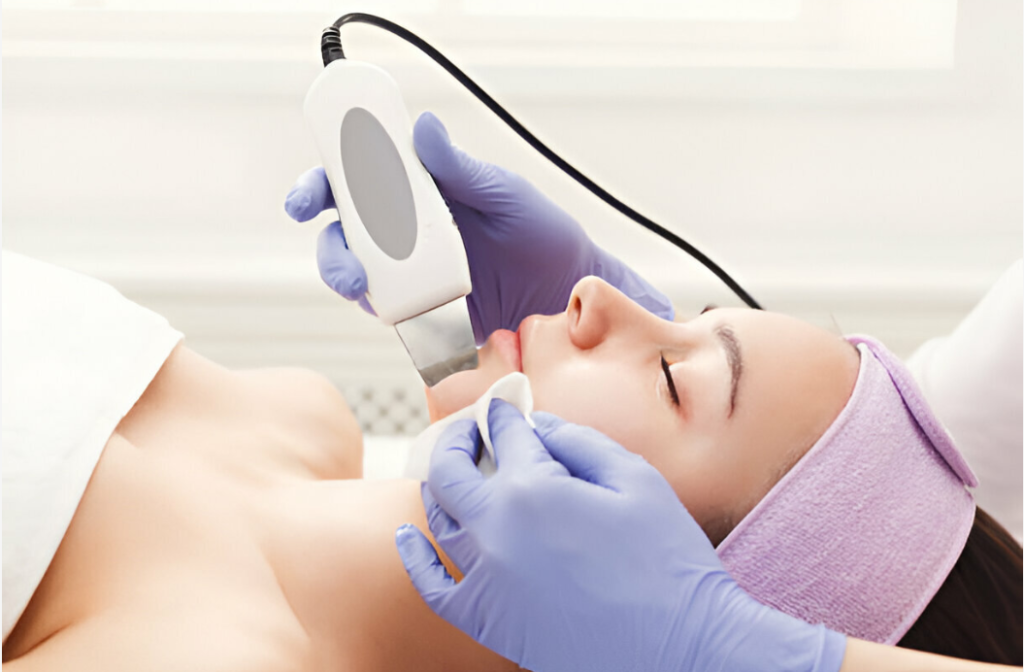In particular, during the monsoon, skin care is crucial and should not be done only once a week. Humidity during the monsoon implies that cream and oil applications are not recommended. Additionally, one cannot have an empty face. Additionally, the monsoon is acne season. So, during the monsoon, more caution should be used. Because of the humidity during the monsoon, acne and scarring are among the most common issues. So, let’s start by discussing it with best skin clinic in Noida Extension.
Scars and acne: Skincare
Over the world, millions of individuals suffer from one of the most prevalent skin conditions. Although it may not go away until old age, it often appears in adolescence.
The development of nodules, cysts, blackheads, and whiteheads—symptoms of acne—can have a detrimental impact on a person’s self-esteem and quality of life. In addition to its physical and psychological repercussions, severe acne can leave behind skin scars that are difficult to remove.

Potential Hormonal Changes Caused by Acne
- The sebaceous glands enlarge and secrete more sebum as a result of the androgen hormones that are released throughout puberty. Hormonal changes brought on by pregnancy and the use of oral contraceptives can also affect sebum production. Similarly, low amounts of androgens in the bloodstream of men and women might aggravate acne.
- Excess Oil Production: The skin’s sebaceous glands’ overproduction of oil, or sebum, is one of the primary causes of acne. Excessive oil consumption can clog pores and result in the development of acne lesions.
- Clogged Hair Follicles: Dead skin cells and excess oil can accumulate and clog hair follicles. Inflammation in these clogged follicles can lead to acne.
- Bacteria: P. acnes, or Propionibacterium acnes, is a kind of bacteria that lives on the skin. When it gets out of hand, it can irritate clogged hair follicles and lead to more severe acne outbreaks.
- Diet: Certain foods, such as dairy products and high-carbohydrate items like bread, bagels, and chips, may aggravate acne. Further research is required to fully understand the connection, as this relationship is still up for debate.
- Stress: While stress may not directly cause acne, it can exacerbate the condition by stimulating the synthesis of androgens in the body, which in turn stimulates the oil glands and hair follicles.
- Medications: Several medications, including lithium, androgens, and corticosteroids, can exacerbate acne.
Types of Acne
- Closed comedones, another name for whiteheads, are little white lumps that are the result of clogged hair follicles that are thinly covered with skin.
- Open comedones, another name for blackheads, are the consequence of clogged hair follicles that break open and turn dark due to oxidation.
- Papules: tiny red, elevated bumps that are inflammatory.
- Pustules: Similar to papules but containing pus, they resemble a whitehead surrounded by red skin.
- Nodules: Solid, big, painful lumps under the skin.
- Cysts are pus-filled, subcutaneous tumours that can occasionally leave scars.
- Types of Scars from Acne
- Atrophic Scars: These are the most common type of acne scars, resulting from a loss of tissue. Among them are: Wounds from ice picks that are small, deep, and pitted.
- Rolling Scars: Broad furrows with a sloping edge.
- Hypertrophic Scars: The body overproduces collagen to mend acne sores, which causes elevated scars.
- To treat and prevent these skin disorders in advance, it could be useful to identify people who are more susceptible to acquiring acne scars and acne itself. For effective treatment programs and personalized skincare advice, seeing a dermatologist is imperative.
Types of Scars from Acne
- Atrophic Scars: These are the most common type of acne scars, resulting from a loss of tissue. Among them are: Wounds from ice picks that are small, deep, and pitted.
- Rolling Scars: Broad furrows with a sloping edge.
- Hypertrophic Scars: The body overproduces collagen to mend acne sores, which causes elevated scars.
- To treat and prevent these skin disorders in advance, it could be useful to identify people who are more susceptible to acquiring acne scars and acne itself. For effective treatment programs and personalized skincare advice by skin brightening treatment Gaur City, seeing a dermatologist is imperative.
- Preventing Scarring: By obtaining prompt and effective treatment, acne may be prevented before it reaches the point where it causes scarring. Dermatologists can also perform treatments specifically intended to minimize the sight of pre-existing scars, such as fillers, laser resurfacing, and microneedling.
- Managing Psychological Impact: Acne and accompanying scars may have a significant negative effect on a person’s mental health and sense of self. Dermatologists can help patients and send them to mental health professionals if necessary.
- Customized Skincare Routines: Depending on the patient’s skin type and condition, DermaLinks’ doctors may recommend skincare products and regimens. This can improve the patient’s skin’s overall health and help reduce acne. Preventive measures and skincare advice are effective for maintaining results after treatment.
- Acne and acne scarring are common skin conditions that can have serious psychological and physical repercussions. Understanding the underlying reasons, taking preventative measures, and having access to treatments are necessary for effective management. For an accurate diagnosis, and personalized treatment plans, and to prevent irreversible scarring, see the dermatologist at best dermatologist in Noida Extension. In the future, acne sufferers should expect more specialized and effective therapies that will improve the health of their skin and general well-being. This is a result of ongoing study and advancements in dermatological treatments.
Who is more susceptible to acne?
- Young adults and teenagers: Puberty-related hormonal changes result in a significant rise in oil production, which clogs pores and causes acne. This age group is more likely to experience severe acne, which can cause scars if addressed.

- Genetic Predisposition: Acne may run in families, increasing the likelihood that acne will develop. Genetic factors that impact skin type, oil production, and the inflammatory response also have an impact on acne.
- Hormonal Imbalances and Changes: Women who experience irregular menstrual cycles, pregnancy, or illnesses like polycystic ovarian syndrome (PCOS) may experience hormonal imbalances that lead to acne. Hormone-related acne is often observed on the lower face, jawline, and neck.
- People with Oily Skin: Excessive oil production can lead to clogged pores and acne. Those with naturally oily skin are more likely to get acne and scars after acne.
- People with High Stress Levels: Stress can exacerbate acne by increasing hormone production, such as cortisol. Furthermore, persistent stress might impede the healing process and increase the risk of scarring.
- Misuse of Skincare and Cosmetics: Using comedogenic or pore-blocking skincare and makeup products might make acne worse. Inadequate cleansing techniques, such as washing your face incorrectly, can aggravate acne and increase the risk of scarring.
- Dietary factors: Diets high in dairy, refined sugars, and processed foods can exacerbate acne. Certain foods may exacerbate acne and produce inflammation, increasing the risk of scarring.
- Certain Drugs: Several medications, such as lithium, corticosteroids, and certain birth control pills, can either cause or worsen acne. When acne develops, people taking these medications should monitor their skin and see a dermatologist.
- Environmental Factors: Pollution and excessive humidity can exacerbate acne by clogging pores. Severe weather and sweating can also intensify acne breakouts.
- Mishandling Acne: Picking, popping, and squeezing pimples can irritate the skin and increase the risk of scarring. Treatments that are too harsh or abrasive may worsen acne-related inflammation and scarring.
- Their objective is to be the premier destination for all things related to skin, hair, and nails. We will do this by fusing the most recent advancements in technology with cutting-edge medical expertise to provide our clients with results that are both durable and natural.
- Their Aim for Care Excellence: We are committed to providing the greatest medical, surgical, and cosmetic dermatological treatments to patients of all ages.
- Personalized Approach: We believe that it’s critical to spend the necessary time getting to know each patient, finding out about their goals, and assisting them in selecting the lifestyle and medical options that will best address their dermatological problems.
- Innovation & Technology: We use state-of-the-art technology and stay up to date with industry changes and trends to stay ahead of the curve. Since patients are given upfront information about their treatment options, expected results, and associated costs, transparency is the cornerstone of skin pigmentation removal cost In Noida.
- Continuous Learning and Research: We actively attend conferences, publish research papers, collaborate with industry experts, and conduct research to enhance our knowledge and offer our clients the best solutions.
